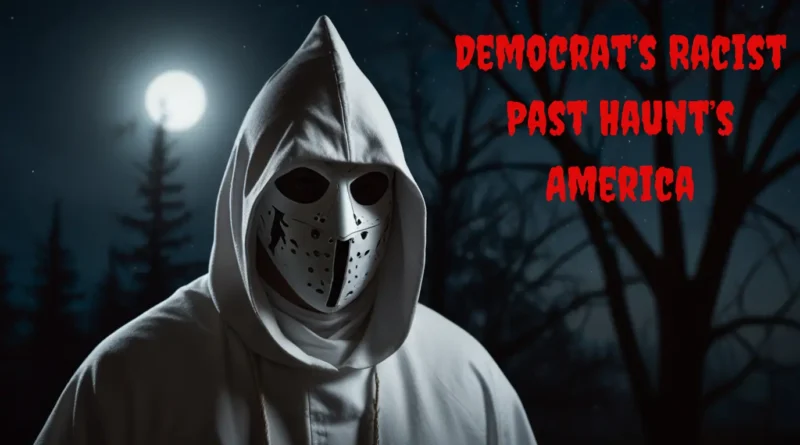A Historical Look at Racism in the Democrat Party
A Historical Look at Racism in the Democrat Party
Table of Contents
1. Introduction
A Historical Look at Racism in the Democrat Party. The Democratic Party’s long history of support or affiliation with racist organizations, particularly during times when racial segregation and white supremacy were very prevalent in American society. This document provides an overview of the most notable racist groups and entities that had associations with the Democratic Party, tracing the party’s racist history. The list is too long to name them all, this article will just focus on a few of the most well known and publicized.
2. Ku Klux Klan (KKK)
First Klan (1865-1871)
The Ku Klux Klan was founded in the aftermath of the Civil War during the Reconstruction era. The Klan aimed to restore white supremacy through terror and violence against African Americans and their allies. Democrats supported or were complicit in Klan activities to regain political control and undermine Reconstruction efforts. The KKK’s activities included lynchings, beatings, and other forms of intimidation to prevent African Americans from voting and participating in civic life.
It wasn’t only blacks or other foreigners that were attacked, but whites included that didn’t support the Democrat Party’s racist views. You either publicly voiced your support for the Democrat Party’s views, or you paid a price.
Second Klan (1915-1944)
The resurgence of the KKK in the early 20th century saw widespread support among white Southern Democrats. The Klan’s influence peaked in the 1920s, with many Democratic politicians either being members or receiving support from the KKK. The Second Klan expanded its targets beyond African Americans to include immigrants, Catholics, Jews, and other minority groups. During this period, the KKK wielded significant political power, and its members often held prominent positions in local and state governments.
3. Jim Crow Era
During the late 19th and early 20th centuries, the Democratic Party in the South enforced and maintained segregationist policies and laws known as Jim Crow laws. These laws institutionalized racial discrimination and were designed to disenfranchise African Americans and maintain white supremacy. While not a specific organization, the system of Jim Crow was a collective effort supported by many Democratic politicians who sought to keep African Americans socially, economically, and politically marginalized. The enforcement of Jim Crow laws involved widespread violence and intimidation, often with the tacit approval or direct involvement of Democratic officials.
4. White Citizens’ Councils
Formed in the 1950s as a response to the Supreme Court’s decision in Brown v. Board of Education, which mandated the desegregation of public schools, the White Citizens’ Councils aimed to maintain segregation and resist civil rights efforts. These councils were comprised of white business owners, civic leaders, and politicians who used economic and political pressure to uphold segregation. Many Southern Democrats were members or supporters of these councils, which advocated for states’ rights and the continuation of racial segregation.
5. Dixiecrats (States’ Rights Democratic Party)
The Dixiecrats, or the States’ Rights Democratic Party, was a segregationist, splinter faction of the Democratic Party that formed in 1948 in opposition to the Democratic Party’s civil rights platform. Led by Strom Thurmond, the Dixiecrats vehemently opposed federal intervention in state affairs regarding race and sought to uphold segregation. The party’s formation highlighted the deep divisions within the Democratic Party over civil rights issues and marked a significant moment in the political realignment of the South.
6. Notable Democratic Politicians Associated with Racist Organizations
Several Democratic politicians have been associated with racist organizations over the years, though many later distanced themselves from these affiliations:
- Benjamin F. Stapleton: Mayor of Denver, KKK member.
- Clifford Walker: Governor of Georgia, KKK member.
- Hugo Black: U.S. Senator from Alabama, KKK member who later became a Supreme Court Justice.
- Robert Byrd: U.S. Senator from West Virginia, early KKK member who later renounced his affiliation and advocated for civil rights.
- Theodore Bilbo: Governor of Mississippi and U.S. Senator, known segregationist with KKK ties.
- John Gordon: U.S. Senator from Georgia and early KKK leader during Reconstruction.
7. Transition and Realignment
A Historical Look at Racism in the Democrat Party. The Democratic Party began to shift away from its associations with racist organizations in the mid-20th century, especially during the Civil Rights Movement. Under President Franklin D. Roosevelt, the New Deal attracted African American voters, particularly in the North, despite ongoing segregationist policies. The 1948 Democratic National Convention marked a significant turning point when the party adopted a civil rights plank, causing a walkout by Southern delegates who formed the Dixiecrat Party.
The 1960s were pivotal for the Democratic Party’s relationship with African Americans and civil rights. Under President Lyndon B. Johnson, the party was instrumental in passing major civil rights legislation, including the Civil Rights Act of 1964 and the Voting Rights Act of 1965, which aimed to dismantle institutional racism and secure voting rights for African Americans.
As the Democratic Party embraced civil rights, many white Southern voters, who had traditionally supported the Democrats, began shifting to the Republican Party, which adopted a strategy that appealed to disaffected white voters. This realignment significantly changed the political landscape in the United States.
A Historical Look at Racism in the Democrat Party
8. Conclusion
The Democratic Party’s history with the KKK and other racist organizations is a significant part of its past. From supporting white supremacy in the post-Civil War era to becoming a proponent of civil rights and equality in the modern era, the party’s journey mirrors the broader struggle for racial justice in the United States. Acknowledging this history is crucial for understanding the complexities of American political development and the ongoing efforts to achieve a more equitable society. The party’s evolution reflects broader societal changes and a repudiation of its earlier associations with racist organizations, marking a clear break from its past and a commitment to civil rights and social justice in contemporary politics.




